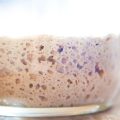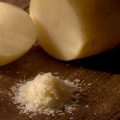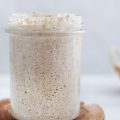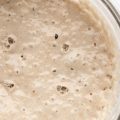While sourdough starters a certainly a game changer, there are a few things you might encounter, especially if it’s your first time making your own. For instance, if your sourdough starter smells like alcohol, you’re probably wondering if it’s time to throw the whole thing away. But before you do, pause, and consider some of the ways to fix it. Because once it’s fixed, you’ll have nothing but successful bakes.
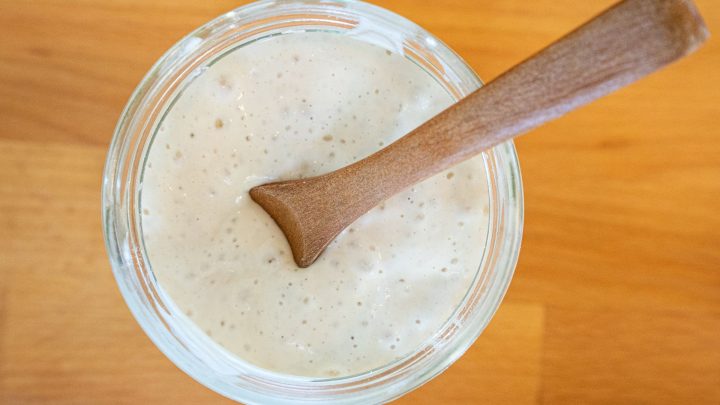
Table of Contents
- What Is A Sourdough Starter?
- Why Does My Sourdough Starter Smell Like Alcohol?
- How To Prevent Your Starter From Smelling Like Alcohol
- How To Fix Sourdough Bread That Smells of Alcohol
- How To Fix Your Starter
- Addressing Other Smells
- Starter Smells Like Alcohol
- Sourdough Starter Smells Like Alcohol FAQs
What Is A Sourdough Starter?
A sourdough starter is a live fermented culture of fresh flour and water. The yeast and bacteria are extracted from their environment to feed on the sugar and starches. A small portion of this wild yeast is added to bread dough to help it rise, and provide a complex, yet delicious flavor.
What Should A Sourdough Starter Smell Like?
A sourdough starter should smell slightly sour with a touch of yeastiness.
If the smell of your starter makes you wrinkle your nose in disdain, then your starter might be beyond fixing at that point!
Why Does My Sourdough Starter Smell Like Alcohol?
Generally, sourdough starters tend to smell slightly alcoholic. The yeast fermentation produces ethanol which is an alcohol, which explains the mild alcoholic scent. However, if your starter smells incredibly alcoholic, then it is a sign that the starter may need to be fed more frequently.
If a starter has been left unfed, the yeast in the flour will continue to go through fermentation, therefore producing ethanol, which will make your sourdough starter smell even more alcoholic.
When the starter hasn’t been fed for quite some time, the yeast and bacteria can die, resulting in failed fermentation when added to the dough.
Simply put, a well-fed starter will not smell so strongly of alcohol. This is because the levels of ethanol are significantly reduced whenever we discard and feed the starter with fresh flour and water.
It’s important to keep your sourdough starter fed so that the lactic acid bacteria and wild yeasts are established enough for the fermentation process in your sourdough bread.
How To Prevent Your Starter From Smelling Like Alcohol
The overpowering smells are caused by hunger, meaning that your number one priority should be to prevent your starter from going hungry.
Fortunately, there are a few ways to go about this:
- Firstly, try to feed your starter more often i.e., once per day.
- Secondly, store your starter at an appropriate temperature. The main thing that causes the bacteria to become more active and hungrier is the heat. The average temperature your sourdough starter should be stored is 75°F. If you store your starter at a higher temperature, then it can become more active and hungry.
- Thirdly, you can always store your starter in the refrigerator to slow down the fermentation process. This is especially great if you wish to take a break from sourdough baking for a while. But if you wish to bake soon, then you should avoid this, and try to take care of your starter properly.
- If you’re planning to store your starter in the refrigerator then you must take it out at least a week before using it to make sourdough bread. This will ensure the starter will be strong and back to health.
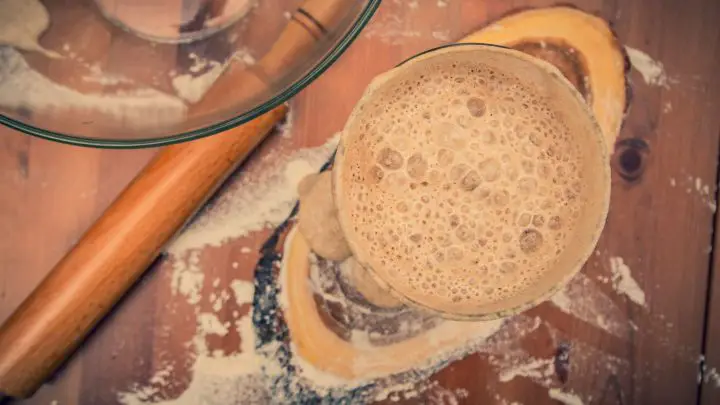
How To Fix Sourdough Bread That Smells of Alcohol
Most of the ethanol produced in the sourdough starter evaporates during the baking process, leaving a hint of an alcoholic aroma to combine with the flavors of your bread. Though small, there is a possibility that the smells may become overpowering.
Here are some common issues that may make sourdough bread smell like alcohol after baking:
Dough Was Over-Proofed
The yeast in the sourdough starter will make use of the oxygen during the early stages of rising. Once the oxygen is depleted, the yeast is left with no air, and it will ferment to produce carbon dioxide and alcohol.
Over proofing leads to more alcohol production, thus a lingering aroma after the bake. This occurs when the dough is allowed to rise for too long, either during the bulk fermentation or the final proofing stage. As the yeast continues to feed on the sugars in the flour, it produces excessive amounts of alcohol and carbon dioxide. The alcohol can impart an unpleasant, overly fermented flavor to the bread, while the excess carbon dioxide can cause the gluten structure to weaken and collapse.
As a result, over-proofed bread may have a strong, almost beer-like smell, a flat and dense crumb, and a less appealing taste.
Dough Was Over Fermented
When dough is over-fermented, it means that the yeast has produced too much gas during the first rise. This occurs when the dough is left to rise for an extended period, allowing the yeast to continue fermenting even after the optimal amount of gas has been created.
As a result, the oxygen in the dough becomes depleted, and the yeast starts producing alcohol instead of carbon dioxide. By the time the dough has fully risen, it will contain an excessive amount of alcohol, which can negatively impact the flavor, texture, and overall quality of the bread. Over-fermented dough may have a sour or alcoholic taste, a dense or gummy texture, and may not rise properly during baking.
To avoid this issue, it’s crucial to monitor the dough during the first rise and stop the fermentation process at the right time by punching down the dough or proceeding to the next step in the recipe.
Dough Was Not Kneaded Dough
When dough is not kneaded sufficiently, the gluten structure remains underdeveloped, which can significantly impact the overall quality of the bread. Gluten, formed by proteins in the flour, is responsible for creating the elastic network that gives bread its structure and texture. If the gluten is not properly developed through kneading, the dough will be unable to stretch and retain the gas produced by the yeast during fermentation.
As a result, more gas will escape from the dough, leading to a slower rise and a longer fermentation process. The extended fermentation time allows the yeast to produce more alcohol, which can affect the taste and smell of the bread. Underdeveloped gluten can also cause the bread to have a dense, heavy texture and a lack of volume.
Ensure proper gluten development by kneading the dough for the appropriate amount of time, as specified in the recipe or until it reaches the desired consistency.
Dough Was Too Warm
When the dough temperature is too high, it can have a significant impact on the fermentation process and the final quality of the bread. Yeast, the primary leavening agent in bread dough, thrives in warm environments. However, if the dough becomes too warm, the yeast will rapidly consume the available sugars during the first rise. This accelerated fermentation can lead to several issues.
Firstly, the quick depletion of sugars means that there will be fewer available for the yeast to feed on during the second rise, resulting in a less effective fermentation process. Secondly, the gluten structure, which is responsible for the bread’s texture and ability to trap gas, will not have enough time to develop properly. An immature gluten network is less capable of retaining the gas produced by the yeast, leading to a denser, less airy loaf.
Maintain the dough at the appropriate temperature, as specified in the recipe, throughout the mixing and fermentation stages.
Starter Was Overripe
When a sourdough starter becomes overripe, it means that the starter has been left to ferment for too long without being refreshed with fresh flour and water. During the fermentation process, the natural yeasts and bacteria present in the starter consume the available nutrients, producing alcohol and lactic acid as byproducts. If the starter is not fed with fresh flour in a timely manner, the microorganisms will exhaust the available nutrients, leading to an increase in alcohol levels.
As the alcohol content rises, it can negatively impact the flavor, aroma, and leavening power of the starter. Overripe starters often have a strong, unpleasant odor reminiscent of acetone or nail polish remover, indicating an excess of acetic acid. When used in baking, an overripe starter can result in bread with a sour, alcoholic taste and a less than optimal rise.
Follow a regular feeding schedule, ensuring that the starter receives fresh flour and water before it becomes overripe.
Weak Starter
A weak sourdough starter can lead to various issues when baking sourdough bread. A starter is considered weak when it lacks the proper balance of beneficial bacteria and yeast, which are essential for fermentation and leavening. When the starter contains an excess of undesirable bacteria, it can negatively impact the bread’s flavor, texture, and rise. Using a weak starter in sourdough bread baking will require a longer fermentation time to compensate for the reduced leavening power. However, this extended fermentation process can result in the production of excessive alcohol, which can impart an unpleasant, overly sour taste to the bread.
To rectify a weak starter, it is crucial to continue feeding and refreshing it for several days. This process involves discarding a portion of the starter and replenishing it with fresh flour and water. By doing so consistently, the starter will gradually become populated with the correct enzymes and beneficial microorganisms, restoring its strength and balance. A mature, well-maintained starter will exhibit better rising capabilities, produce a more pleasant flavor profile, and contribute to the overall quality of the sourdough bread.
How To Fix Your Starter
If your starter releases some smells that are a tad overpowering, the best way to combat this is through regular feedings.
Simply discard a small portion, and feed the rest with fresh flour and water. A common trait of a hungry starter is one that strongly smells of alcohol.
Addressing Other Smells
Vinegar-y
If your sourdough starter is giving off a strong vinegar-like aroma, it’s a sign that the acidity levels are too high. This can happen when the starter’s pH balance is off, and the lactic acid bacteria are being overpowered by acetic acid bacteria.
Focus on maintaining a healthy pH balance of around 4.0-4.5 and adjusting the hydration to a thick pancake batter consistency. Feeding the starter regularly with a higher flour-to-water ratio and using clean utensils can help balance the microbial environment, reducing unwanted acidity. Embrace a slight tanginess as part of sourdough’s distinct character, while ensuring it doesn’t reach overpowering vinegar levels.
Cheesy or Rotten Smells
These unpleasant odors can indicate that your starter has become contaminated or is fermenting improperly.
Sometimes, all your starter needs is a fresh influx of flour and water to help rebalance the microbes. Try discarding all but a small amount of your starter (about 1/4 cup or 50g) and feeding it with equal parts flour and water.
After feeding, let your starter sit at room temperature for a few hours to give the yeast and bacteria a chance to reactivate. If it starts to bubble and rise, that’s a good sign that it’s on the mend.
If you’ve been using the same type of flour to feed your starter, try switching things up. Different flours can introduce new enzymes and microbes that can help get your starter back in balance. Whole wheat, rye, and other heritage grains can be particularly helpful.
If all else fails, it may be time to start over with a new starter. While it can be disappointing to say goodbye to a starter you’ve been nurturing, sometimes it’s the best way to ensure you’re working with a healthy, vibrant culture.
Starter Smells Like Alcohol
Keep the alcohol smells in your favorite drink, such as whisky sour. Not in your starving starter.
A strong-smelling starter will usually indicate that it is hungry and needs to be fed. Frequent feedings will mute the overpowering smells, making it perfect for baking sourdough bread.
Sourdough Starter Smells Like Alcohol FAQs
Can I Use Sourdough Starter If It Smells Like Alcohol?
Yes absolutely. If your starter smells like alcohol, this is just a sign that it is hungry.
How Do You Get The Alcohol Smell Out of A Sourdough Starter?
Simply increase the starters feeding frequency, unless the starter has been neglected for a while, whereby it may require a little more effort to revive it.
Can I Use My Sourdough Starter If It Smells Like Acetone?
Yes, absolutely. However, you should feed your starter before using it, as the smells indicate that it is hungry!
How Can You Tell If Sourdough Starter Is Bad?
If your starter has been neglected for long enough it will develop mold, or show signs of being overtaken by bad bacteria.
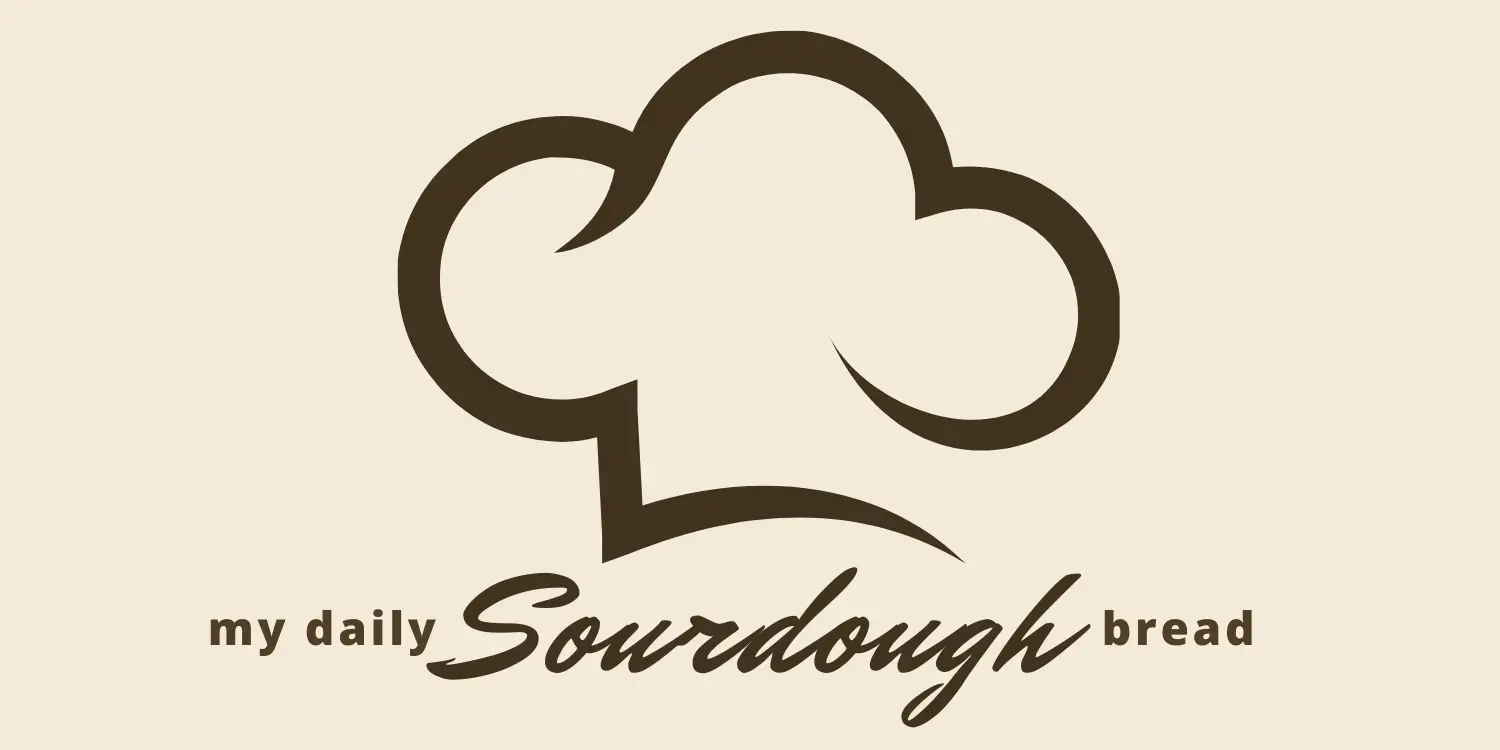
![Sourdough Starter Temperature [Beginner'S Guide] 3 Sourdough starter temperature [a beginner’s guide]](https://www.mydailysourdoughbread.com/wp-content/uploads/2023/01/blog-images-48-120x120.jpg)
